Are Correctional Officers Actually Supporting Prison-based Animal Programs?
Hard-to-adopt dogs are starting to symbolize a ray of hope for inmates in Florida who qualify to enter a program that rehabilitates both them for their release back into society, and the dogs as they search for their forever homes.
The Florida Section of Corrections-approved TAILS program -- which stands for Teaching Animals and Inmates Life Skills -- focuses on pairing at-chance dogs with institutionalized men. The at-adventure dogs are categorized every bit those that would accept been euthanized or were seized from dog-fighting, calumniating or hoarding environments, Jen Deane, executive director of TAILS and Pit Sisters, a Jacksonville-based arrangement that takes dogs in need from city shelters, told ABC News. The programme costs near $lxxx,000 a yr to run and is funded entirely by Pit Sisters and donations.
"We take the dogs that demand united states the most," Deane said, adding that they alive at the correctional facilities full-time for the elapsing of the program and slumber in crates next to their trainers in dorms that house several inmates.
"Information technology's amazing to exist able to witness."
On Jan. 10, Adam Goldberg, the lead photographer for a Tampa-based pet photography company, AGoldPhoto, was given unprecedented admission to prisoners in their living quarters at the Putnam Canton Correctional Institution in Palatka, Florida.
Training typically occurs outside or in the visitor's room, where Goldberg has taken photos before, simply the Florida Department of Corrections gave him special permission to spend time in the dorms, giving him a "rare" glimpse into the restricted area where the dogs are cared for "effectually the clock," Goldberg said.
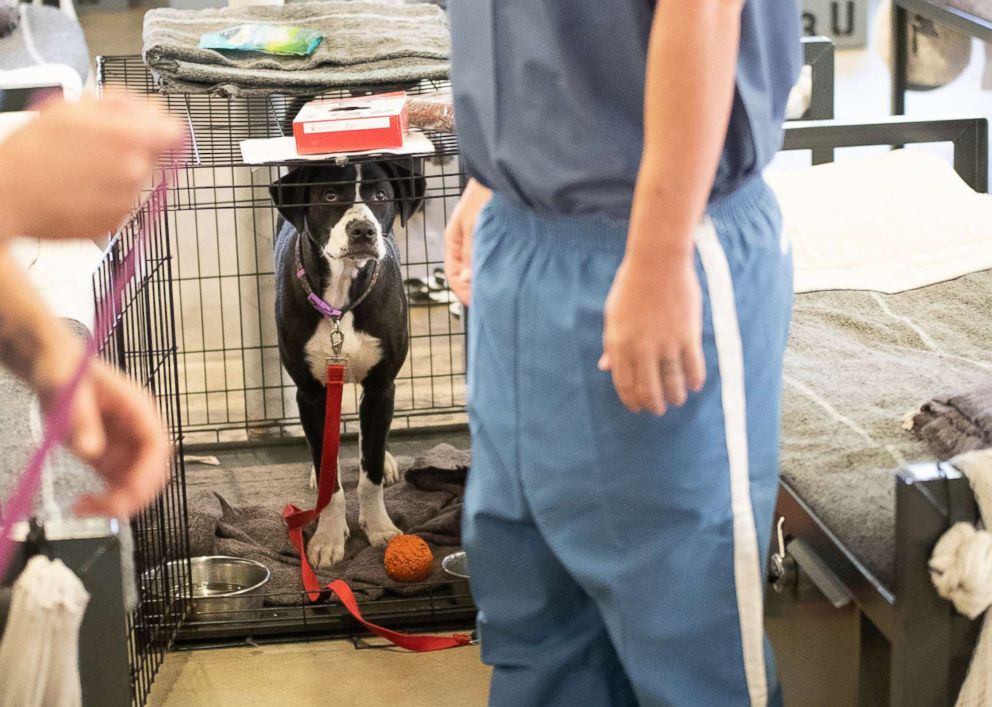
Dogs from the Teaching Animals and Inmates Life Skills plan, or TAILS, live in the Putnam Correctional Facility in Palatka, Fla., and sleep next to their trainers and handlers in a dorm that houses several inmates.
AGoldPhoto Pet Photography
The photographer has seen with his ain eyes the positive influences the pups have on the inmates, and the change is near instantaneous, he said.
Often when he arrives, the prisoners are "scowling and don't desire to be at that place," but all that changes when the moment comes that they get to interact with the pups.
"When they're training the dogs, it'southward an escape," he said. "They're smiling and interacting with the dogs that they're training."
One of the commands Goldberg witnessed the dogs practicing was "count time," in which the dogs get to their kennels when the facility staff counts the inmates. Another command is pray, when a canis familiaris places 2 paws on an inmate's arm. They besides were trained how to sit and lay downward, Goldberg said.
Goldberg noticed the stress relief the dogs brought to the jail staff as well, some of whom have adopted the pups who have completed the program, Goldberg said.
What struck Goldberg the most about the photo shoot was his proximity to the inmates' living conditions -- the beds, the footlockers, and the fact that the inmates have to sleep next to individual rolls of toilet paper, something that most in society "will never see."
Inmates must earn the correct to participate in the program
The programme involves a "very strict process" for screening both inmates and dogs, Deane said. Inmates who have been charged with whatsoever violent or animal-related crimes are not eligible, and they also cannot accept had any behavioral issues while incarcerated, and then participating in the program is substantially a reward for adept beliefs. Fifty-fifty after the dogs graduate, the inmates are permitted to stay in the programme and go a new canis familiaris "pretty quickly," Deane said.
"We are cautious of who we allow to interact and train with the dogs," Deane said.
The dogs are also assessed by a canine aggression and behavior proficient before they are chosen for the programme.
Each domestic dog is assigned to two inmates, who act as a handler and a trainer, Deane said. They both spend equal amounts of time with the domestic dog, but the trainer tends to have more experience than the handler, Deane said.
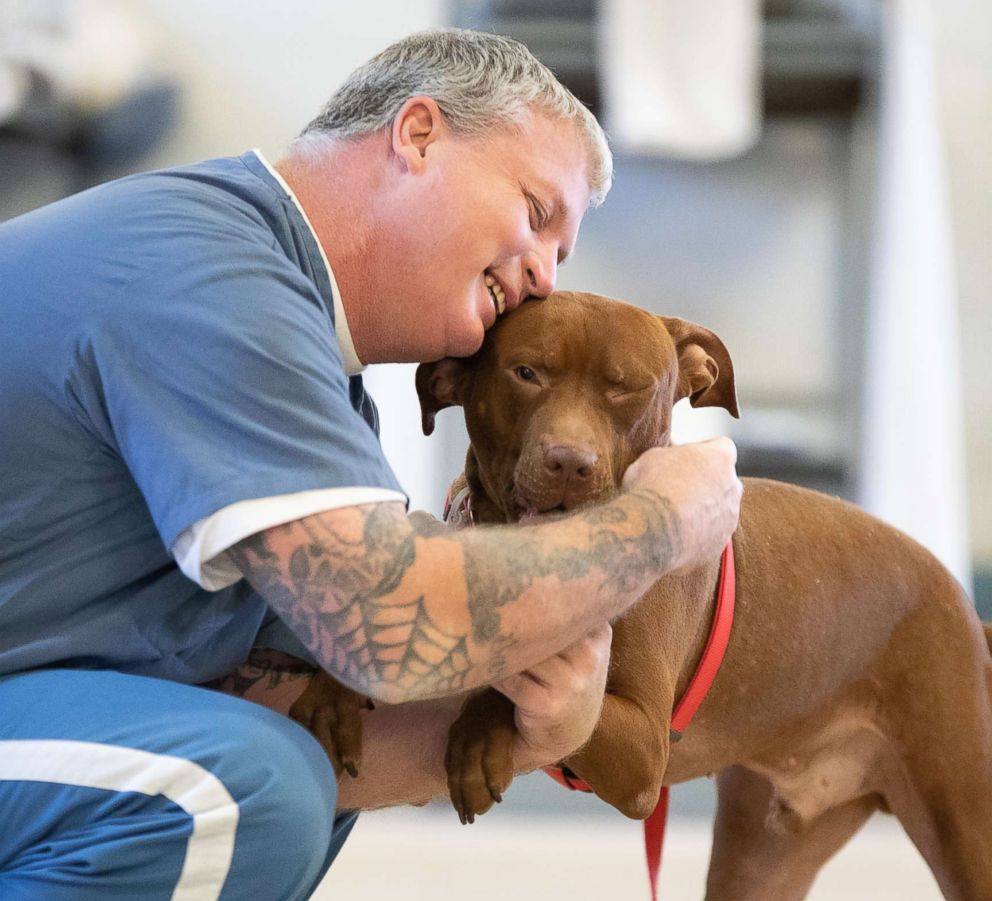
The joy the inmates gain from interacting with the dogs in the TAILS plan is nigh instantaneous, photographer Adam Goldberg told ABC News.
AGoldPhoto Pet Photography
The inmates interact with the dogs for several hours throughout the day, which includes play fourth dimension outside and multiple training sessions, Deane said.
The curriculum -- which typically trains four to eleven dogs at a time -- takes near two to three months to complete and is internationally recognized through the Association of Professional person Dog Trainers, giving inmates professional experience for their resume.
Currently, the plan is operating at six different facilities effectually the country, which also includes minors being detained past the Florida Department of Juvenile Justice. The staff at each facility oversees the training.
The plan is not notwithstanding bachelor at any women's facilities, but Deane and her colleagues are in talks to launch TAILS in a girl's juvenile facility in North Florida, she said.
"We know that the human-animal bail is very powerful."
Many of the inmates come from broken families and take never experienced unconditional love -- until they come in contact with a pup whose survival depends on them, Deane said. In add-on, because the dogs oft come from cleaved, storied backgrounds, the inmates identify with them.
"They see themselves in the dogs," Deane said.
Jennifer Wesely, a professor of criminology at the University of Northward Florida, said the positive behavioral effects of prison fauna programs (PAPs) include enhanced empathy, emotional intelligence, advice, patience, self control and trust.
Wesely, who is studying focus groups of inmates who have participated in the program, is looking at how the plan can touch "criminogenic masculinity," or the thought that some marginalized men grow upward in conditions or cultures where they don't accept access "to the mainstream ways to be a man" and "learn lessons through abuse, poverty and social exclusion."
Through her research, Wesely is trying to decide whether the "powerful" human-animal bond can interrupt "criminogenic masculinity" traits such as chance-taking, never backing down and vehement behavior, resulting in what is substantially an identity change.
"A lot of these guys had early lessons in masculinity," she said. "They learned through very calumniating behaviors that they could never show weakness. They had to kind of shut down that aspect of their identity in order to survive."
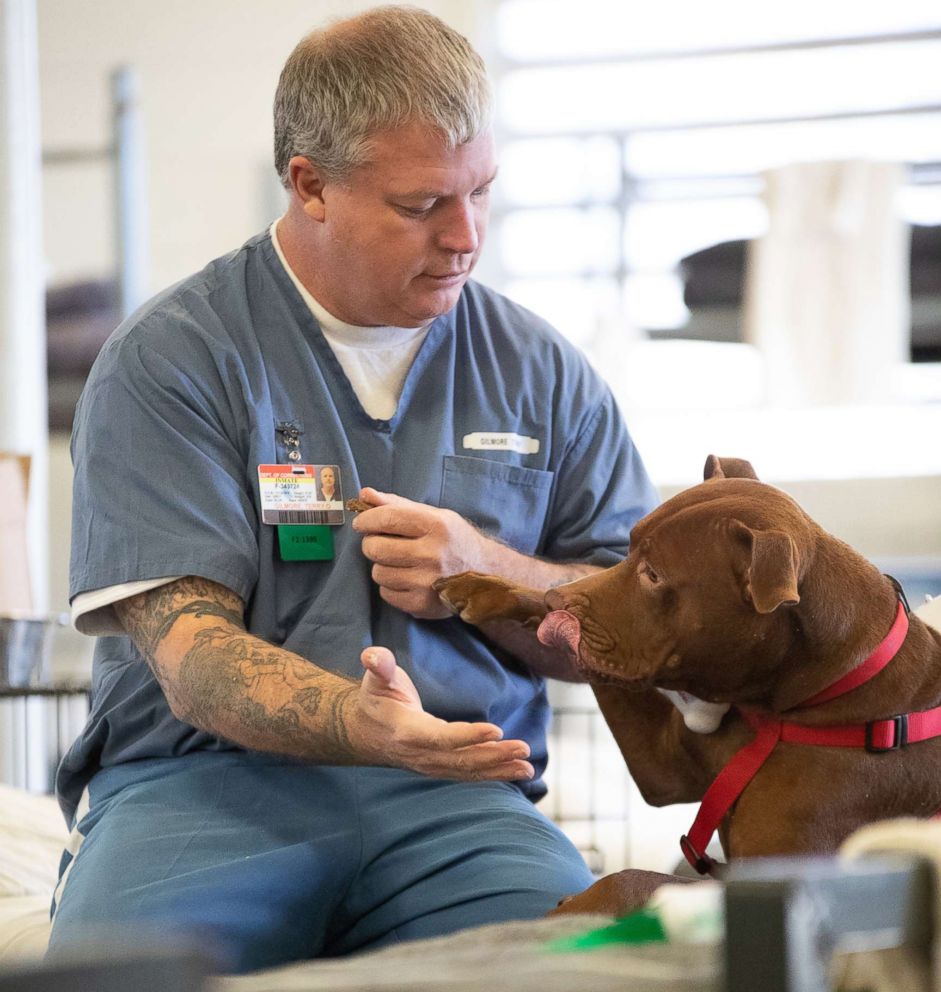
One of the commands the dogs in the TAILS program larn is to "pray," which involves placing both easily on the inmate's arm.
AGoldPhoto Pet Photography
Merely, participating in the TAILS program "really forces them to develop deeper self-reflection" to effectively engage with the dog, Wesely said, adding that "information technology trickles down to the leash," and prisoners discover just how connected they are to the pups
Deane noted that the programme isn't intended just to teach the men how to train, but to assistance them "digest back into society." Out of the "hundreds and hundreds" of participants she'south spoken to, their "number 1 concern" is how they will fit in when released back into community, she added.
"The program teaches the guys empathy, patience, responsibility, teamwork, and it teaches them about love," she said, adding that she's witnessed the transformations showtime-hand.
Many inmates told Deane that participating in the plan was the "first time they felt unconditional love" and the "first time they were able to care for someone other than themselves," Deane said. Considering the programme teaches positive reinforcement, the inmates who have children have likewise expressed to Deane that it has made them better fathers, she said.
The number of success stories are rampant
Deane could become on all day about the number of inmates she's seen thrive after completing the program, and she's constantly writing recommendation letters for sometime inmates once they get out, she said.
1 inmate who "excelled" in grooming decided he wanted to be a dog trainer when he got out, so TAILS gave him a scholarship to become certified, Deane said. When he moved south to Palm Coast and was in need of a job, Deane then called the executive director of the Flagler Humane Guild, who hired him as a kennel technician.
The former inmate was soon promoted to head of adoptions at the shelter and is now working as a veterinary technician, Deane said.
"He actually did extremely well with information technology and is however doing information technology," Deane said. "And he learned that that'southward what he wanted to practise from the dog program."
More than than 500 dogs accept completed the programme and through Pit Sisters have either been adopted, are existence fostered or are being housed in a commercial space the organization leases, Deane said.
"That was ane of the goals of the program," she said. "Nosotros spend all this time training them, we want to make sure they're not sitting back in a shelter."
Canine aggression and behavior expert Jim Crosby described one particular success story in which a tan-colored Pit bull named Cuddles was seized every bit part of a domestic dog-fighting arrest in Canada and had been determined to be too dangerous to be placed in a home.
All 21 dogs seized from that surroundings were supposed to be euthanized, but an creature welfare group intervened and got permission for Crosby to fly there to evaluate them, he said. In one case he got at that place, he determined that only ii of the animals were "bonafide homo dangers," and that the rest had a possibility for a second change.
"Cuddles was 1 of those dogs," he said.
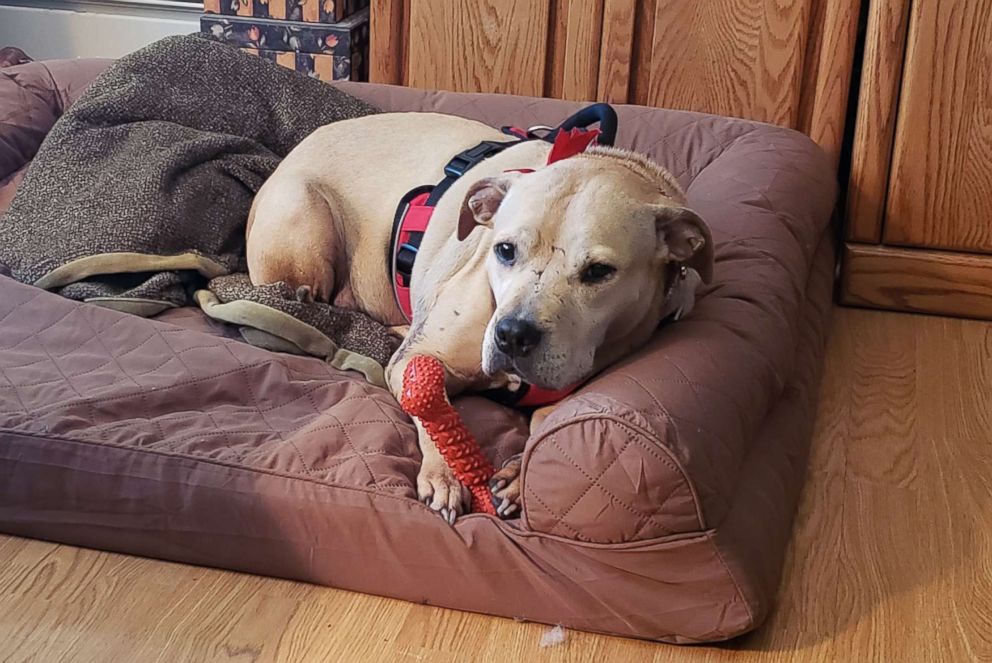
A pit bull name Cuddles was initially accounted besides unsafe to be placed with humans after she was rescued from a dog-fighting environs in Canada.
Courtesy Pit Sisters
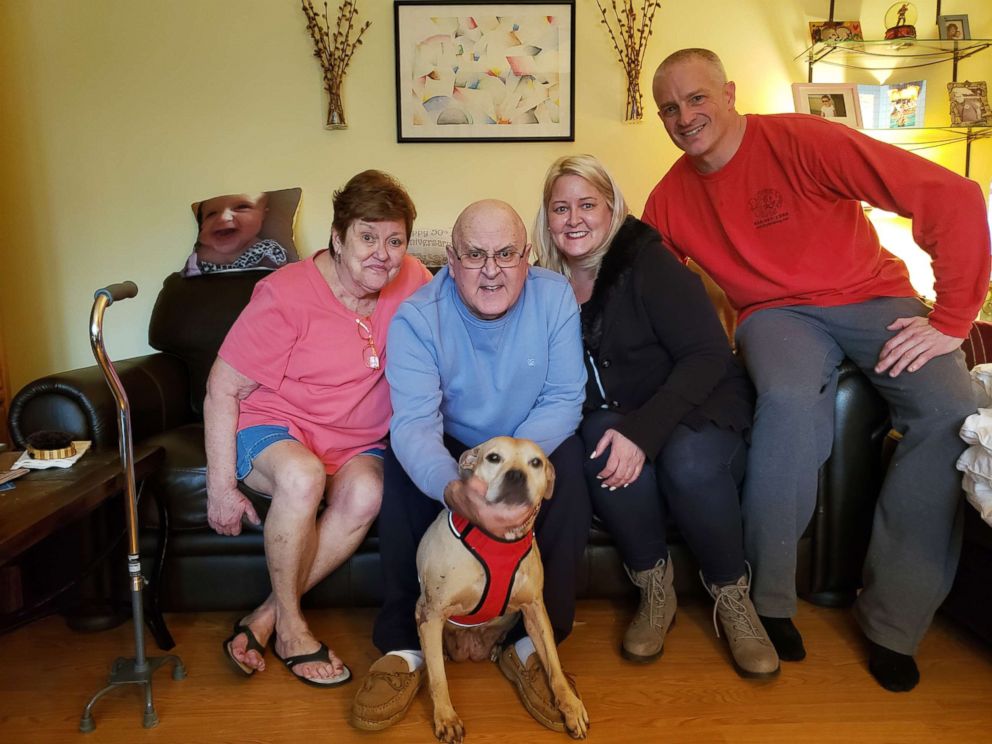
Afterwards completing the TAILS programme, Cuddles is at present serving as an emotional support dog to 73-year-old Billy Brauer of Cornwall, Due north.J.
Courtesy Pit Sisters
Cuddles, who had the total boxing scars of a canis familiaris that had experienced the viciousness of a fighting ring, went to rehab training before she was entered into the TAILS programme where she graduated with tiptop honors and earned a Canine Proficient Citizen title, Crosby said. She is now an emotional support domestic dog for a 73-year-old retired firefighter and veteran living in Cornwall, New Jersey, while six of the other dogs who were once sentenced to death now work with police enforcement throughout Florida as detector dogs for bombs and drugs, Crosby said.
"Those dogs that were in one case gonna be killed are at present saving lives," he said.
And graduation time is always emotional, Deane said.
"I've seen tears -- these big, tough guys crying when their dogs graduate considering they dear them so much."
Three sets of graduations are coming up in February. Subsequently that, it's on to the adjacent fix of dogs, whom Deane tries to go situated "equally apace every bit possible."
"I can't think of any other creature that is so forgiving."
Crosby, a retired lieutenant for the Jacksonville Sheriff'south Office, non only assesses all of the dogs who participate in the program but is also called to duty all over the state to evaluate whether seized dogs are safe to exist effectually humans.
Crosby is oft called to testify in cases in which a domestic dog kills a human and said that he's but met a handful dogs who he believed were a danger and couldn't be rehabbed.
"It never surprises me when humans do something terrible to dogs," he said. "But it's very, very rare that dogs impale a human being."
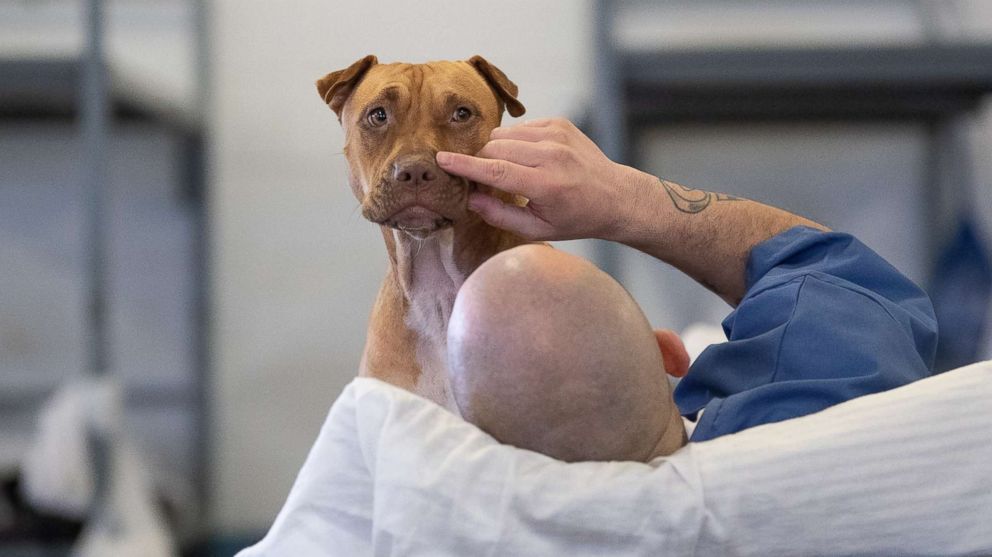
Dogs from the Instruction Animals and Inmates Life Skills programme, or TAILS, interact with inmates at the Putnam Correctional Institution in Palatka, Fla.
AGoldPhoto Pet Photography
Crosby said dogs are "incredibly forgiving of things that we have washed to them in the by." Rehabbing and training "even the most frightened or aggressive domestic dog" is a thing of taking the time to build trust that "goes both ways."
"You tin can accomplish incredibly surprising things -- incredibly positive things," he said.
Crosby described working with TAILS as an "incredible opportunity," especially given his past constabulary enforcement feel. Now that Crosby spends time with inmates who aren't necessarily aware of his previous job championship, his view on "what we can do for inmates" has inverse.
"I spent years but simply throwing them in jail, throwing them in prison for doing bad things, just I never actually thought about what happens later," he said. "I just assumed that whenever they got out, I'd be seeing them once again. They would practise something, and I'd be putting them dorsum in prison."
Crosby has witnessed how the dogs, "especially the ones from damaged backgrounds," connect with the inmates and alter their behavior by instruction them mutual trust, mutual caring, compassion and empathy.
Source: https://abcnews.go.com/US/prison-animal-programs-benefitting-inmates-hard-adopt-dogs/story?id=60600864
Posted by: partainovertutremew.blogspot.com

0 Response to "Are Correctional Officers Actually Supporting Prison-based Animal Programs?"
Post a Comment